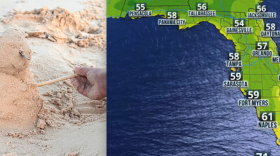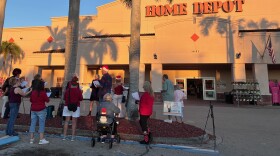AILSA CHANG, HOST:
In Los Angeles, a physician accused of sexually assaulting hundreds of patients at the University of Southern California has died. A trial was expected to start next year on charges related to some of those cases, but now his accusers say his death has allowed him to avoid justice. From LA, Saul Gonzalez of member station KQED reports.
SAUL GONZALEZ, BYLINE: In 2018, the University of Southern California was rocked when women came forward accusing the school's longtime student health gynecologist, George Tyndall, of sexually abusing them in incidents dating back decades. While studying law at USC in the early 1990s, Audry Nafziger was one of Tyndall's patients.
AUDRY NAFZIGER: I'm a completely changed person because of it.
GONZALEZ: Nafziger says that Tyndall sexually abused her by touching her in a non-medical way and taking photos of her body.
NAFZIGER: We trust doctors. I trusted him. I didn't understand that everything he had done to me was actually for sexual interest. It was like my whole world came crashing down at that moment.
GONZALEZ: Tyndall was ultimately accused of sexually abusing hundreds of patients. In response, USC agreed to pay more than a billion dollars in civil settlements, a record amount for such a payout by a college or university. The school's then-president also resigned. Tyndall was supposed to go on trial next year on several sex crime charges, but then he died earlier this month at the age of 76, reportedly of natural causes.
NAFZIGER: You know, it's a huge disappointment.
GONZALEZ: Although Audry Nafziger wasn't a plaintiff in the criminal case against Tyndall because of the statute of limitations, she says his death has left her and many other victims feeling like Tyndall escaped justice.
NAFZIGER: Him passing before this case got off the ground for trial - it was definitely my biggest fear and very discouraged to see that happen.
GONZALEZ: Tyndall's attorney, Leonard Levine, says his client always maintained his innocence and looked forward to the trial as a way to clear his name.
LEONARD LEVINE: And all he ever wanted was his day in court, which he was confident would end in his complete exoneration. Now, neither he nor his accusers will get that, and that is very unfortunate for everyone involved.
GONZALEZ: John Manly, an attorney for many of Tyndall's accusers, including two in the criminal case, blasts Los Angeles County District Attorney George Gascon for moving too slowly to bring Tyndall's case to trial.
JOHN MANLY: You know, when you're a serial predator and you get to escape prison by simply waiting it out, that is injustice. And, you know, it's nauseating to see all these public officials give lip service to protecting women and, when the rubber meets the road, they do nothing.
GONZALEZ: In an emailed statement to NPR, the DA's office says it understands the disappointment of Tyndall's victims. But the DA says the prosecution was slowed by the COVID-19 pandemic, which shuttered courts. Tyndall's death has also revived criticisms of USC for not doing more to protect students from Tyndall, especially when co-workers reported him years earlier for inappropriate behavior during patient examinations. Attorney John Manly argues it's an example of a bigger problem.
MANLY: I think that the problem of doctors engaging in sexual misconduct is much more widespread than people imagine, especially at academic institutions, because behind every George Tyndall that gets access to their patients for years to sexually abuse them is an administrator who knew and did nothing.
GONZALEZ: USC doesn't have a response to George Tyndall's death, but a spokesperson said the school had put in place many safeguards in recent years to protect students from sexual assault.
For NPR News, I'm Saul Gonzalez in Los Angeles. Transcript provided by NPR, Copyright NPR.
NPR transcripts are created on a rush deadline by an NPR contractor. This text may not be in its final form and may be updated or revised in the future. Accuracy and availability may vary. The authoritative record of NPR’s programming is the audio record.







